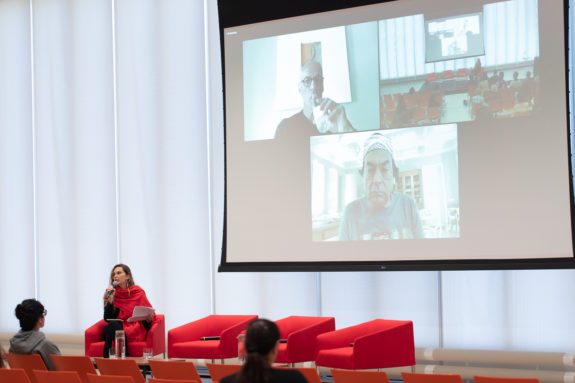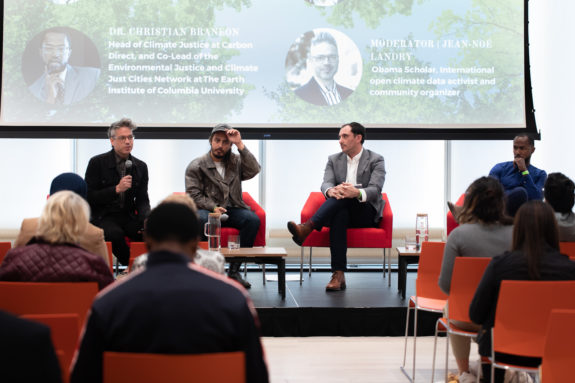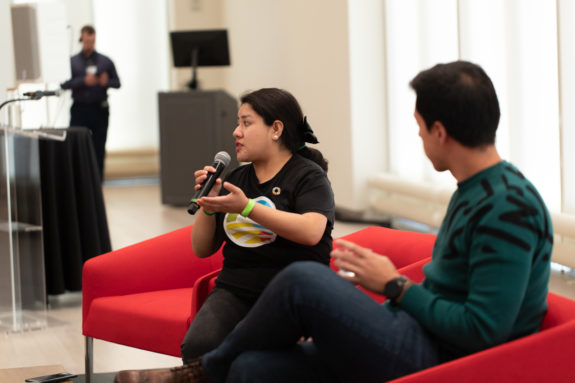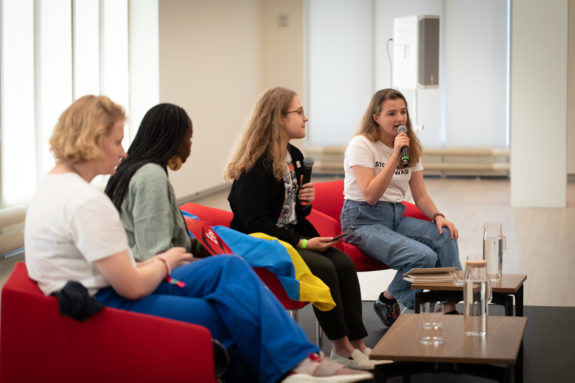On Friday, September 23, Columbia Global Centers | Rio de Janeiro, Columbia World Projects (CWP), and Obama Foundation Scholar Alumni brought together speakers and panelists to speak on the ever-changing standards of spirituality, technology, finance, and civic action in regard to climate change.
Hope for climate innovation is difficult when it’s so easy to feel hopeless. But with the prediction that the Earth’s temperature will continue to rise by 4° C without intervention, hope—even spirituality—may be what is needed. During the event, “Climate, Hope & Science: Shifting paradigms in spirituality, technology, finance, and civic action,” each of the speakers and panelists addressed the meaning of hope for the climate. The event was part of a larger slate of Columbia Global programs and events designed to bring regional expertise on key global issues, such as climate change, to the Columbia community, and, in turn, share Columbia University’s innovative and related faculty research expertise.
As an introduction to the event, Teresa Borges, senior program manager of Columbia Global Centers in Rio de Janeiro, and Waafa El-Sadr, executive vice president of Columbia Global and director of Columbia World Projects, addressed the global effects of climate change and the need to amplify solutions to shift the patterns around civic conversation in regard to the climate.
Continuing the conversation on climate, Obama Foundation President David Simas elaborated on his meaning of hope in regard to the climate. Simas said that, to make positive impacts on communities, there must be a relationship of trust. More importantly, we must “leverage local leaders” to utilize their execution of policies.
Thomas J. Trebat, director of Columbia Global Centers | Rio, continued the conversation about climate and the Columbia Global Centers. The global centers serve two important purposes:
1) To allow Columbia to learn from great leaders;
2) To take and spread knowledge within the Columbia Community.
Columbia’s history of paving the way for climate science is important, but Trebat also remarked that it “takes everyone to deal with hope and science.” Everyone in global society is impacted by climate, despite feelings of exclusivity. While Brazil especially has been excluded from climate talks (despite it hosting the first Earth Day in 1970), having events such as this one paves the way for further inclusive conversations. Flávia Maia, a 2020-2021 Obama Foundation Scholar, believes events like these “put this diversity of perspectives in conversation, to help regionalize and to ground the climate debate in our experience.”
The introductory remarks to the panels addressed how climate, hope, and science are intertwined; in order to improve the climate, hope and science must be utilized. Each of the panels then spoke to a specific aspect of climate involving spirituality, technology, finance, and civic action.
Climate, Science, & Spirituality
Maia introduced the panel by speaking on the need to connect spirituality and the environment. The panel discussed the importance of education surrounding the environment as well as the importance of not considering humans to be above all. Krenak ponders, “What do we truly need to exist?” He provided his own view on the answer: we must “stop being a species of greed, and that there is abundance if we learn how to relate to Nature.” Gleiser added to this, acknowledging that rampant consumerism is something we each need to address. Oftentimes, one may feel, in Gleiser’s words, “too small.” Gleiser continued that we each must examine “our role in this.” By making small changes in our day-to-day life and choosing to support companies that value the environment, people can reinvent their relationship with the Earth to live in a “symbiotic relationship” rather than a “parasitic” one.
In his video presentation, Gleiser notes that it is essential to “understand our connection to the root of our existence.” The world is interconnected with us. He continued, “We are everything, we don’t have to be part of it. We can be all of it.” Maia left listeners with the question, “What [can we] do?”
Climate, Technology, & Communities
Prior to panelists beginning their discussion, Landry announced “Data and technology is the stuff of power.”
Vanizette answered first, noting his organization’s focus on connecting and empowering environmental leaders, and speaking on the intersectionality of climate and data. People must have a “transparency of data,” he noted, especially in terms of greenwashing, wherein a company conveys false or misleading information about its environmental friendliness (something companies such as H&M and Starbucks have been accused of doing).
Next, Braneon addressed the intersection of anti-racism and positive climate practices. When interacting with communities, especially low-income majority-minority communities, he affirmed that people “need to look at communities before we impact them.” Braneon elaborated that taking time with communities and allowing them to come up with solutions is the most effective strategy for creating positive change.
Kruczkiewicz expressed the need to understand incentives when coming up with climate solutions. He reflected on how, when he helped map the impact of a natural disaster on refugee camps to prioritize and deprioritize aid to different camps, those who sent a map always replied, “I hope this helps.” But he wondered, “Do [they] really care if this helps or not? [They] hope that perhaps [they’ll] get credit.” He declared we must understand the motive behind why one works for climate solutions.
Landry asked the panel, “what makes them hopeful?” Braneon was hopeful for a greater “commitment to acknowledge the responsibility of the climate crisis.” Kruczkiewicz wasn’t as hopeful, noting that Hurricane Ida, which largely affected New York’s lower-income community, was given minimal coverage and the severe impacts of Hurricane Fiona were not effectively communicated. There is a “disproportionality of impact” when climate disasters occur, although Kruczkiewicz is hopeful that “more people are thinking of loss and damage.” Landry affirmed his hope that conversations such as these will continue to occur.
Climate, Finance, & Civic Action
Juan Guzmán stated it is a “duty to incorporate” finance in discussions on climate. Sandra Guzman added the importance of “transparency where money is and how it is being allocated.” She spoke on how much action around “climate change surround[s] money, justice, and civic engagement.”
Further building on Sandra Guzman’s point, Juan Guzmán added that we must “understand why climate justice is at the base of climate finance.” Sandra Guzman continued on how the money is there, but people need to put it in the right places. Ultimately, the question is never if the money is there, but rather where is the money going?
Later in their talk, both panelists reflected on the importance of platforms, acknowledging their ability to speak out while other activists do not have the same privilege. In addition to the need for “empathy and solidarity,” there is a need to hold both companies and governments accountable in terms of finances and to continue to hold conversations on climate and money.
Hope & Urgency: A Call to Action
The panel of youth activists each spoke on how they’ve been impacted by the fossil fuel industry and war, especially the Ukrainian war in Ball’s case, calling on each of the audience members to “join, don’t just watch.”
Each of the four panels served to highlight the key roles of spirituality, technology, finance, and civic action in conversations on climate change. Ultimately, they stressed the importance of uniting with communities to make change. Not only is it important to understand the community one is working with, but it is also vital to connect with them and allow them to produce solutions. Once individuals push for greater change through their actions, they can unite with others and make positive advancements for the world.
“Climate, hope, and science are words that often don’t come together in the same sentence… hope is what keeps us moving forward… hope is not naive. On the contrary, from our perspective, hope is a collective effort, it is grounded in community action, and it is informed by science. Having hope is not about waiting, it is about having strategy, focus, and discipline to transform the systems that caused this crisis.”
—Flávia Maia, 2020-2021 Obama Foundation Scholar
Images via Daniel Byers


 2 Comments
2 Comments




2 Comments
@Anonymous When is the new Climate School starting construction?
@Anonymous when hell freezes over